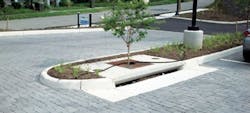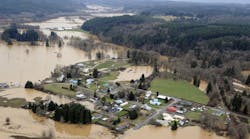Small Town Has Big Idea for Storm Water Management
The bedroom community of Farmville, Va., has a rich history, a picturesque university and plenty of small town charm. What it did not have was a storm water management program. As a result, one of the town’s major thoroughfares flooded for years almost every time it rained. The town’s lack of a storm water program created challenges in 2012 during the planning phase of Campus Walk, a mixed-use development with offices, retail space and apartments within walking distance of Longwood University.
The redevelopment project site, previously home to a tire service center, had an impervious asphalt parking lot with an existing drainage problem. The site presented two challenges. First, the nearest drainage system available for tie-in was more than 500 ft away, typical for a rural project but unusual for a downtown area. Second, what little storm water infrastructure that did exist was already overtaxed and inadequate for the proposed Campus Walk project.
Traditional storm water management solutions would not work. There was no room for a typical storm water retention pond, which would allow the water to be released slowly into the ground. Excavation for an underground water storage system, with the same goal of slow release, was not an economical option due to time, labor and cost demands.
Campus Walk’s developer, Walk2Campus Holdings LLC, and its engineering firm, Terra Eng., selected Filterra Bioretention Systems to help with the project’s storm water issues. Filterra was chosen because it offers innovative technologies that control storm water runoff at its source with natural, cost-effective treatment processes.
Filterra suggested a complete, low impact development (LID) site solution that would address the project’s storm water issues and satisfy the requirements of the Virginia Department of Conservation and Recreation (DCR) for phosphorus removal under the Chesapeake Bay Preservation Act. In addition to the LID design, the solution would be both effective and economical. Storm water issues now fall under the jurisdiction of the Virginia Department of Environmental Quality (DEQ).
The plan, approved and permitted by the Virginia DCR, was to install Filterra BioPave permeable interlocking concrete pavers throughout the Campus Walk parking lot. The pavers, manufactured by Filterra’s sister company, Eagle Bay Hardscape Products, would detain, infiltrate and drain the water to one of three Filterra bioretention units, which would clean the storm water before it was funneled into Chesapeake Bay. The system would substantially reduce pollutants in the water, including sediment, nutrients, heavy metals, oil and grease. It also would provide complete management up to and including 25-year storm events while giving Campus Walk developers a fully functioning parking lot.
Modeling shows the system is capable of capturing 95% of the peak outflow of a 10-year storm. Actual monitoring of a different Filterra BioPave system in North Carolina confirms this, with data resulting in more than 95% load removal of total suspended solids, nitrogen and phosphorous.
The installed system, completed in May 2013, is helping the Campus Walk project effectively deal with both storm water volume and quality. A total of 19,300 sq ft of pavers cover the entire parking lot, treating 53,143 sq ft. Installation took one day for the three bioretention units and about 10 days for the BioPave parking lot.
The solution took an impervious asphalt surface area and converted it into a system that covers the broad spectrum of DEQ requirements for pollutant removal efficiencies and volume control. “We converted already budgeted impervious wearing surface dollars into a site-specific storm water plan that kept the developer’s costs to a minimum,” said Bob Bridges, director of sales and storm water solutions specialist for Eagle Bay.
“This was the first project of its kind in Farmville,” said Will Nash, erosion and sediment control administrator for the town. “It has successfully kept this site below previous peak storm water runoff levels, preventing our older storm sewers from being overtaxed any further. It’s working very well.”
Download: Here


